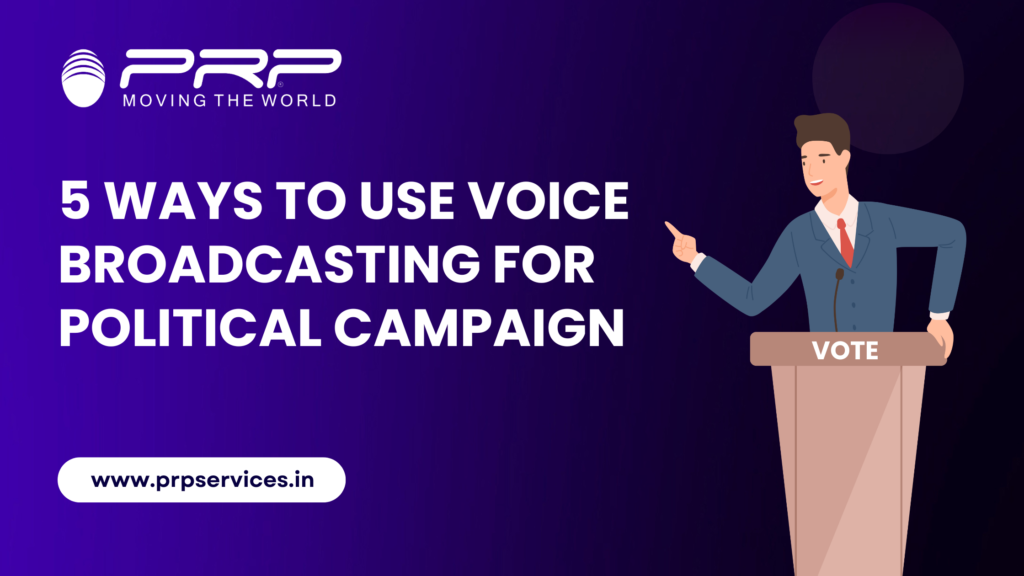Political parties have had to redesign their traditional methods for promoting election campaigns because people are more aware of their electoral choices today than ever before. Voice Broadcasting was one of the modern election promotion strategies used in the last Lok Sabha elections. By 2019, there are expected to be 813 million mobile phone users in the world.
but, before we consider how political parties can or have used Voice Broadcasting in their election campaigns, let’s take a closer look at what Voice Broadcasting is.
What is Voice Broadcasting?
By sending out prerecorded voice messages through automated telephone calls to large numbers of recipients at the same time, voice broadcasting is a form of mass communication. It allows organizations to reach a wide audience with important announcements, reminders or calls to action efficiently and effectively. Targeted outreach can be achieved through voice broadcasting by segmenting recipient databases and customizing messages.
By pressing the keypad keys on their phone, recipients can interact with the message, provide valuable feedback, or confirm their engagement with it. It is easy to engage audiences and drive desired outcomes with voice broadcasting, whether for political campaigns, fundraising efforts, community alerts, or customer outreach.
Political Voice Broadcasting’s Best Uses For Election Campaigns
1. Personalized Voter Outreach
The voice broadcasting method allows campaigns to target specific demographics or geographic areas with customized messages. It is possible for campaigns to craft messages that resonate with different groups of voters by segmenting voter databases based on factors such as age, location, or interests. Voters are more likely to engage and support a campaign that is personalized because it fosters a sense of connection and relevance.
2. Get Out the Vote (GOTV) Initiatives
Voice broadcasting can play an important role in GOTV efforts by reminding supporters to cast their ballots on election day, one of the most critical aspects of any political campaign. In addition to providing important information such as polling locations, hours of operation, and transportation options, campaigns can schedule automated calls to targeted voters. Campaigns can mobilize their supporters and maximize voter participation by leveraging voice broadcasting for GOTV initiatives.
3. Issue Advocacy and Education
Campaigns can educate voters about key policy positions and issues using voice broadcasting. Campaigns can use recorded messages to inform voters about the importance of specific policy initiatives, whether they are promoting healthcare, immigration, or the economy. Voice broadcasting can also be used by campaigns to dispel myths and to dust misinformation, ensuring voters are well-informed when voting.
4. Volunteer Recruitment and Engagement
It is essential to develop a strong volunteer network in order to succeed in a political campaign. Voice broadcasting can be used to recruit volunteers, inform them of upcoming events, and keep them updated on campaign activities. Campaigns can increase at ground level mobilization and organizational effectiveness by keeping volunteers informed and engaged through regular communication.
5. Surveys of Polls
As a political organization that strives to ensure the well-being of its citizens, then it is crucial to understand people’s desires becomes an essential part of the campaign planning. To get the maximum responses to your polls. It is essential not to overwhelm your respondents with long questionnaires. Conducting your polls and surveys using voice broadcasts will ease many of the processes involved here. By using this method, you can ensure that you get the best results with little expenditure.
Election Campaign Voice Messages for Voter Engagement
Election campaigns are fast-paced, so capturing voters’ attention and conveying your message effectively is key. In addition to traditional methods like door-to-door Publicity and digital advertising, voice messaging can be a game-changer for reaching and mobilizing your target audience. We’ll explore how to craft compelling election campaign voice messages that engage voters and drive engagement in this guide.
Know Your Audience
Take the time before recording your voice message to understand your audience’s demographics, interests, and concerns. Tailoring your message to resonate with their values and priorities increases your chances of capturing their attention.
Keep it Clear and Short
It is important to keep your voice message Short and to the point. Focus on conveying your core message in a clear and understandable manner. Avoid overly complex language or slang that may confuse or delete your listeners.
Start with a Compelling Hook
Turn off with an attention-grabbing question, an eye-opening statistic, or a powerful personal story to capture your listener’s attention
Highlight Key Issues and Solutions
Communicate clearly how your candidate or platform addresses voters’ concerns and improves their lives in your voice message. Highlight issues facing your constituency and state your proposed solutions or policy positions.
Include a Clear Call to Action
There should be a clear call to action in every campaign message that prompts listeners to act. Engage listeners and encourage them to get involved in your campaign by urging them to volunteer, donate, attend a rally, or cast their vote.
Maintain Authenticity
Effective communication requires authenticity. Demonstrate feeling for the challenges voters face and a sincere desire to address their needs.
Test and Repeat
You should conduct A/B testing before launching your voice message campaign to determine which message variation will Connect best with your target audience. Keep refining and improving your messaging strategy based on feedback and insights gathered from testing.
Ensure observation with Regulations
Be aware of regulations governing automated calling and voice messaging, including obtaining allowance from recipients and providing options for opting out of future communications. A campaign’s reputation can be damaged if it fails to execute regulations.

